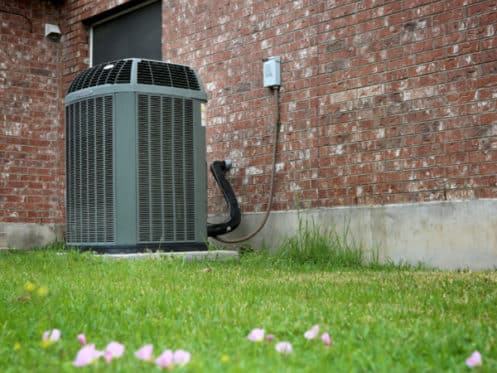Whether you need to replace your existing heating system or are deciding which one to have installed in your newly constructed home, there are many options out there to choose from. Heat pumps are becoming more and more popular due to their high energy efficiency and ability to both heat and cool homes. However, is a heat pump the right type of heating system for your home?
How Does a Heat Pump Work?
A heat pump works by simply transferring heat from the air outside to the inside of your home. It does this via refrigerant, which successfully traps the outside heat and transports it inside. Many people are surprised to discover that outside air does contain heat that can be successfully absorbed by a heat pump’s refrigerant during the wintertime.
Heat pumps can be connected to ductwork or ductless mini-split units. This makes it ideal for both existing and new homes, as well as any additions that you may decide to add to your home in the future.
Your Climate Matters
One key component to consider when it comes to purchasing a heat pump for your home is the type of climate that your home experiences during the colder winter season. Heat pumps are only effective as a sole heat source down to a certain temperature.
While most older heat pumps stopped producing heat when temperatures dipped below freezing, newer systems will still work effectively down to temperatures around 25 degrees Fahrenheit. Once temperatures dip below what your heat pump is rated for, you’ll start to notice a stark decrease in your system’s performance.
Assess Your Average Temperatures
Since heat pumps do lose efficiency when temperatures get too cold, it’s vital that you assess the average wintertime temperature in your area. If temperatures remain below 25 degrees for weeks on end, then a heat pump may not be the most effective heating system for your area.
However, if temperatures only occasionally dip below 25 degrees Fahrenheit, then a heat pump can still be a viable option. The key is to have a secondary source of heat for those times when temperatures get too cold. An alternative source of heat can include anything from electric baseboards to a gas furnace. The idea is to use your heat pump until it’s no longer effective and then switch over to your secondary heat source.
A Note on Resistance Heating
All modern heat pumps are specifically designed with resistance heating. This feature kicks on when your system senses that the outside air is too cold for the refrigerant to effectively extract enough hot air to adequately warm your home to the desired temperature on your thermostat.
When resistance heating kicks on, it uses electrical coils to produce heat. This is somewhat similar to electric furnaces. The amount of heat that the coils produce will vary depending on what your system determines it needs, in addition to the refrigerant’s natural heating.
While resistance heating may sound like it fully solves the problem of an ineffective heat pump during very cold temperatures, that’s not the whole story. When your heat pump relies on resistance heating, it can get very costly very quickly.
Remember that it’s relying on electricity to produce heat, which is the most expensive fuel out there. This is why a secondary heating source is recommended for cold climates. You can enjoy all the energy-efficient benefits of a heat pump while still cashing in on low heating costs when the temperature dips below 25 degrees Fahrenheit for an extended period of time.
What are the Main Benefits of a Heat Pump?
When weighing the decision of whether or not to purchase a heat pump for your home’s wintertime heating needs, you should be fully aware of the benefits that it can provide you. First and foremost, a heat pump functions as both a heat source and a cooling source. It can be a great investment when you want to add a whole-home cooling and heating system to your new or existing home.
A big advantage of using a heat pump over other types of heating systems is that they’re more energy efficient. Since they’re simply transporting heat instead of producing it, they use minimal energy. This can go a long way in saving money on your energy bills throughout the year. Additionally, you don’t have to worry about scheduling the delivery of heating oil or propane.
Another necessary benefit to mention is that many states and even the federal government are giving out tax incentives to those who invest in this energy-efficient heating and cooling option. The specific tax rebate that you’ll receive will highly depend on the type of system that you purchase and where you live. However, the tax rebate can likely help to offset some of the upfront cost of installing a new heat pump in your home.
Indoor air quality is something that every homeowner should be concerned with, especially during the winter season. Because heat pumps transfer outside heat to the inside of your home, this helps to bring in the fresh air, which actively works to dilute any poor-quality air. This can leave your family feeling refreshed and healthy during the cold winter season.
If you currently have a furnace, we’re sure that you’re used to the sound of it constantly turning on and off. With a heat pump, you can enjoy the great benefit of quiet operation. No more having to turn the television volume up when your heating system is running.
Additionally, heat pumps are ideal for providing optimal safety for your home and family. Since there is no combustion, there are no harmful emissions that need to be vented out of your home. Also, you never have to worry about a potential natural gas leak or a leak in your on-site heating oil tank.
The Drawbacks of a Heat Pump
Probably one of the biggest drawbacks to purchasing a heat pump for your home is its high upfront cost. You can definitely purchase a gas or oil-burning furnace for much less than a heat pump. You may also find that some HVAC contractors don’t install these systems. You may have to find a specialty installer for your area.
Another drawback of heat pumps is that they require electricity to run. If your power goes out, you’re out of a heating system until it comes back on. Investing in a generator can be a great way to help alleviate this issue for your home.
Lastly, heat pumps will eventually lose efficiency and stop working when temperatures get too cold. If you live in a climate where the temperature regularly dips below 25 degrees Fahrenheit, then you’ll want to pair your heat pump with a secondary heating source or consider a different type of residential heating system.
Expert Heating Services
Christian Brothers Air Conditioning Plumbing Electrical offers expert heating services for the whole Glendale, AZ area. We also provide professional plumbing, cooling, electrical, insulation, ductwork, and indoor air quality services. Contact us today to get the expert assistance that you need!










